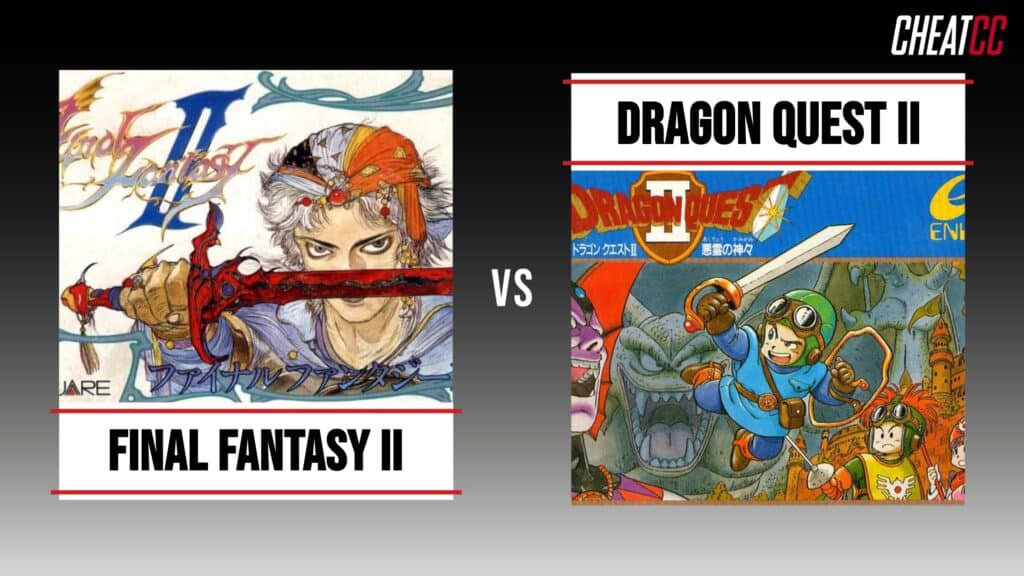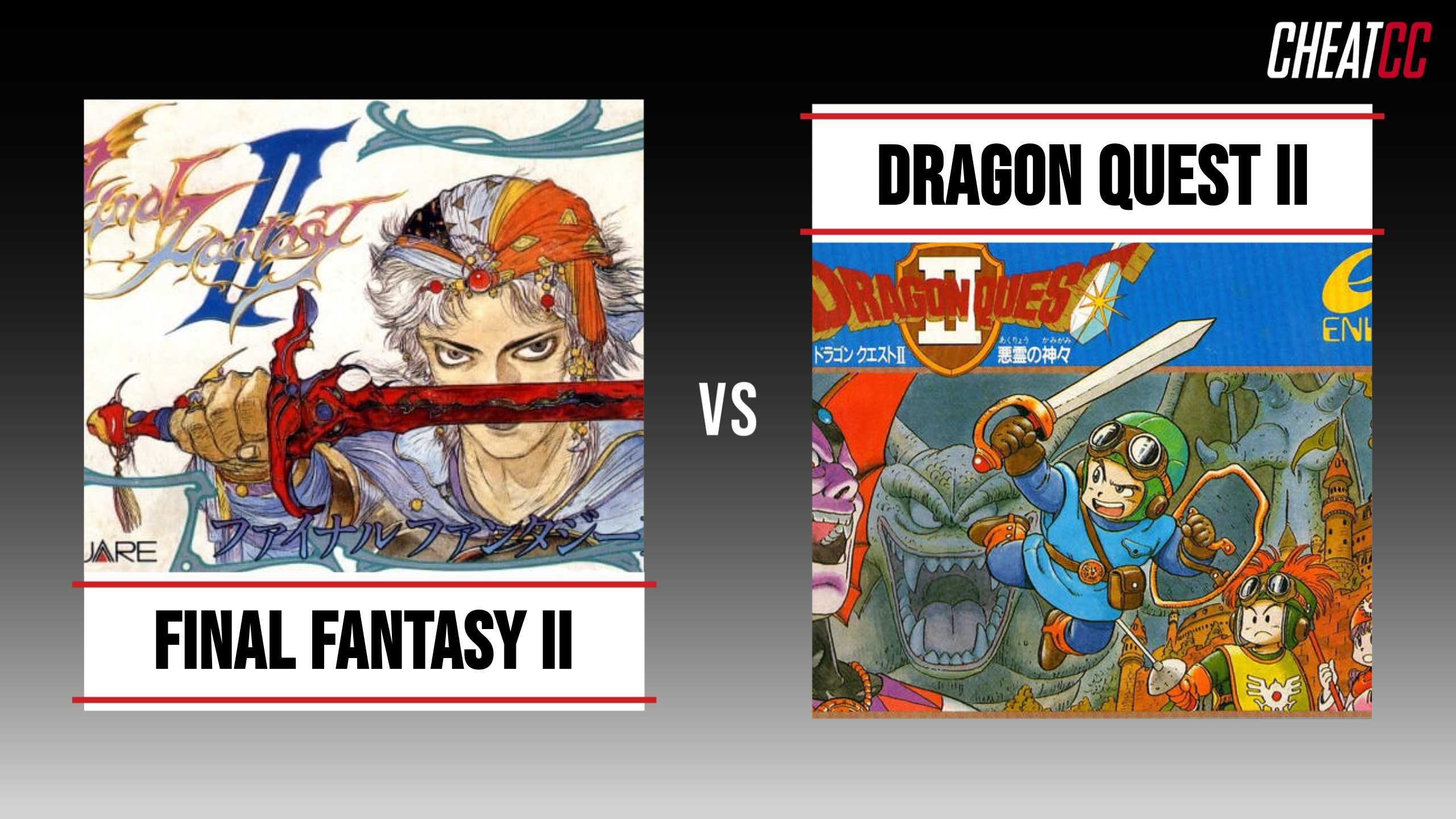Final Fantasy and Dragon Quest share so much in common that it’s practically impossible to bring up one without iviting comparison to the other. It makes sense, considering that both series are instrumental in establishing the conventions of Japanese-developed role-playing games (JRPGs) and are also massive pillars on which their respective publishers (Square and Enix, now one company) would stand. However, long before Square’s acquisition of Enix in the early 2000s, the two companies would enjoy a bit of a friendly rivalry and competition to see which JRPG series would reign supreme as the Famicom’s best. 1988 would see fans pit Final Fantasy II vs Dragon Quest II for JRPG sequel supremacy.
Final Fantasy‘s arrival just a year after Dragon Quest happened to coincide with the launch of Dragon Quest II. And though Final Fantasy II also arrived a year after the original game in its series, it proved to be a drastically different affair than the first game in the franchise. Conversely, Dragon Quest II is very similar to the original Dragon Quest, albeit with the addition of party members and a little bit longer in length. Both Final Fantasy II and Dragon Quest II are worthwhile sequels that would soon be overshadowed by later games in their respective franchises, but each are important for establishing the paths that their series would tread.
Final Fantasy II vs Dragon Quest II: Side-by-Side Comparison

The success of both Dragon Quest and Final Fantasy helped to ensure that both Enix and Square, respectively, needed to begin work on sequels almost immediately. Sure enough, both Dragon Quest II and Final Fantasy II arrived one year after the original games in both of their series. Interestingly, where Final Fantasy II boldly establishes the franchise as an anthology, Dragon Quest II continues the story of the first game but moves the action ahead several hundred years into the future. As it turns out, this adherence to and reverence for tradition would become a trademark of the series.
| Characteristic | Final Fantasy II | Dragon Quest II |
|---|---|---|
| Release Year | 1988 | 1987 |
| Release Platform | Famicom | Famicom |
| Release Year of Predecessor | 1987 | 1986 |
| Release Year of Next Game in Series | 1990 | 1988 |
| Total Sales | 800,000 units | 2.55 million units |
| Review Aggregate Score | 80% | 83.5% |
| New Features | Password System, changes to Character Progression and Leveling, rotating fourth Party Member | Open-World format, Non-Linear Progression, Party Members, Mini-Games |
| Re-Releases/Remakes/Ports | 16 | 10 |
| Director | Hironobu Sakaguchi | Koichi Nakamura |
| Accolades | Famitsu‘s third-highest rating game of 1988 | 17th Best Video Game of All-Time in Famitsu |
| Availability on Modern Platforms | PC, Nintendo Switch, PS4/5, Mobile | Nintendo Switch, PS4/5, Mobile |
Final Fantasy II vs Dragon Quest II: 5 Must-Know Facts
Here are 5 must-know facts about Final Fantasy II and Dragon Quest II:
- While Dragon Quest II iterates and expands on the original Dragon Quest without reinventing the wheel, Final Fantasy II is a drastic departure from its predecessor in terms of its character progression and leveling systems. Additionally, the game features a brand new world and cast of characters completely separate from the world in the original Final Fantasy.
- Not only does Dragon Quest II have a more positive critical reception than Final Fantasy II, it also has sales figures that absolutely dwarf those of Square’s competing sequel. Interestingly, Final Fantasy II holds the distinction for being the worst-selling game in the series.
- One of the main contributions that Final Fantasy II makes is establishing that the series would move forward as an anthology. Similarly, Dragon Quest II establishes that groups of games in the franchise would connect to one another and take place in the same world.
- While both Final Fantasy II and Dragon Quest II went on to receive several re-releases and ports throughout the years, there are 16 versions of Final Fantasy II, including some remakes of the original Famicom release. Comparatively, Dragon Quest II has far fewer remasters and remakes.
- Dragon Quest II‘s success led Enix to release Dragon Quest III just a year later to see the success of the franchise continue, while the somewhat muted reception to Final Fantasy II saw Square take some time to aim for the fences with its follow up. Final Fantasy III wouldn’t arrive until 1990, completely reinvigorating the franchise.
Final Fantasy II vs Dragon Quest II: Breaking Ground or Staying the Course
Prior to the release of both series’ first sequels, players had no way of knowing the direction that each franchise would take for their respective second games. As it turns out, Final Fantasy II took some dramatic risks that would end up hurting the game’s long-term success, but would also help to prove that the series could work as an anthology and feature a new world and new cast of characters in each entry. On the flipside, Dragon Quest II mostly plays it safe, providing players with improvements and innovations to the core gameplay of the original Dragon Quest in the sequel and proving that something doesn’t need fixing if it isn’t broken.
Final Fantasy II vs Dragon Quest II: Sales and Reception
To say the sales and critical reception to Final Fantasy II are telling is a bit of an understatement. While the initial reaction to the game from Famitsu saw the publication give it glowing reviews (a score of 34/40), later versions of the game would not fare as well and receive much harsher scores. Additionally, Final Fantasy II holds the distinction of having the lowest sales of any game in the franchise, failing to meet the numbers that its predecessor and sequel would eventually reach. Conversely, Dragon Quest II would be one of the best-selling games in Japan the year of its release and also earn high praise from several outlets, including Famitsu.
Final Fantasy II vs Dragon Quest II: Establishing Franchise Norms
Most telling about the release of both Final Fantasy and Dragon Quest‘s first sequels is how their reception and performance would end up influencing how each series progressed moving forward. Hironobu Sakaguchi always envisioned Final Fantasy as an anthology with each game meaning to feature a new world and a new group of heroes that intend to save it. Final Fantasy II is, at least in part, able to get away with its significant changes to the series’ origins because of its new world, cast, and conflict.
On the other hand, Dragon Quest II firmly establishes that the series will stick to what works in favor of leaving behind what drew in fans in the first place. As a result, Dragon Quest still maintains a reputation of being the “comfort food” of JRPGs, providing fans with an experience that executes the fundamentals of the genre to perfection without attempting any radical changes.
Final Fantasy II vs Dragon Quest II: Ports and Re-Releases
The success and adoration of both Final Fantasy and Dragon Quest would dictate a demand for remakes, remasters, and re-releases of each series’ games on multiple platforms. Although Final Fantasy II has the weakest sales and some of the most average critical reception of any game in the series, it has 16 different versions across multiple platforms and console generations since its original launch on the Famicom. Dragon Quest II, for all its success both critically and commercially, only has 10 remakes, remasters, and ports. Interestingly, Dragon Quest II‘s first re-release would come courtesy of the Super Famicom title bundling it and the original Dragon Quest, highlighting Japanese players’ love for Enix’s flagship franchise.
Bottom Line
Any fan of JRPGs would likely find it hard to definitively choose between Final Fantasy and Dragon Quest. Even though both series would help to define the characterstics of JRPGs, they each offer near polar opposites in terms of their gameplay, mood, and presentation. In a perfect world, JRPG fans could simply own and play all the games in both franchises, but the parameters of reality dictate that there are only so many resources (namely, money and time) for investing into either one or the other. In terms of sequels, Dragon Quest II is the better follow-up over Final Fantasy II for the ways that it understands the strengths of its predecessor and simply builds on them. Final Fantasy II is a great game that somewhat buckles under the weight of its own innovation, and as a result it ultimately fails as a sequel.
